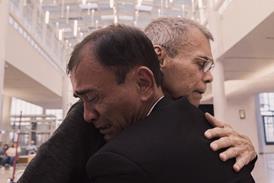The Middle East may be rich in stories, but local films have struggled for profile overseas. Matt Ross looks at how ambitious funding initiatives are improving the situation for film-makers in the region
A big part of the Gulf’s drive for a functioning film industry lies with developing local talent, and several territories see film-maker investment as key to the industry’s future development. Given the relative wealth of the Gulf, this is bound to manifest itself in the shape of funding initiatives.
The local talent base is passionate about storytelling, but can be inexperienced in the practicalities of modern movie-making ― and this is precisely what regional initiatives are attempting to address. Standout actors are largely unknown outside individual territories and a significant, seasoned crew-base has yet to materialise. Building a talent pool that can be called upon by visiting productions is the goal of several organisations, such as the New York Film Academy in Abu Dhabi. President Simon Hunter lists creating and developing a talent base as one of the school’s fundamental goals.
“We are hoping to reach a stage where Middle Eastern films are received by a large audience in the Middle East”
Claire Naber, Red Sea Institute of Cinematic Arts
Headed by industry stalwart Marie-Pierre Macia, Abu Dhabi’s Sanad fund was set up in 2010 and will offer $500,000 annually to new feature projects in the Middle East. The fund, albeit in a different incarnation, gave completion money to Son Of Babylon, Iraq’s nomination for the 2011 Academy Awards, and Macia believes the fund is the best way to ensure local talent receives the funds it needs to flourish.
“We travel a lot to search for, meet and follow new young directors,” she says. “For this first year of the Sanad fund, we have received over 50 applications for post-production support and over 100 applications for development support.” Feature-length films that have directors or producers from applicable Middle Eastern countries are able to apply for backing, though the fund is not available for films in pre-production, with only development or post-production applications accepted. Sanad recently announced its first round of funding, with 28 recipients.
Macia says the fund is “trying to keep in mind the quality of the projects, the necessity a project has to appeal to an Arabic and worldwide audience and, last but not least, the need for financial support that a director and producer have to start and finish a project.”
Strong commitment
The Doha Film Institute (DFI), meanwhile, is accepting the first applications for its own Doha Film Fund, which backs international co-productions and regional projects. The mandate to support 10 Arab features each year through all stages of development reflects a strong commitment to local production.
Amanda Palmer (pictured), executive director of the DFI, explains: “It’s about creating sustainable film financing… Just signing cheques doesn’t get good films made. The long-term goal is to create a film-financing fund that is self-sustaining, but in the meantime there are a lot of projects that just need emergency help to get their films finished.”
DFI is also open to co-investing within the region, accepting partnerships with other Middle Eastern and North African film industries. International features are encouraged to apply, but are asked to use Arab staff, and to shift some part of the production to Qatar or the surrounding region.
Such regional collaboration is becoming increasingly common as individual countries realise their efforts can be pooled. The Dubai and Cairo film festivals recently announced that their respective co-production markets would combine to promote Arab film-making, allowing aspiring talent to apply to both initiatives for support and funding, while also potentially doubling the exposure films receive on completion.
The Abu Dhabi Film Commission is also looking to be proactive. Perhaps keen to avoid a repeat of Sex And The City 2 ― the UAE-set movie that was filmed in Morocco ― the commission is actively seeking partners for Abu Dhabi-based productions. Speculation hints at Canada as the most likely partner, with the possibility that crews from both nations will enjoy relaxed regulations and financial incentives to shoot in each other’s countries.
“It’s about sustainable film financing… Just signing cheques doesn’t get good film made”
Amanda Palmer, Doha Film Institute
Whatever the relative merits of the regional film industries, their continued existence relies on selling films abroad. While local audiences are increasingly enamoured with cinema, international money will drive the industry’s future. Claire Naber of the Red Sea Institute of Cinematic Arts (RSICA) says that, while there is a way to go for Jordan at least, the country has the bigger picture in mind. “At the moment a handful of Jordanian films have been made, and they have just started to receive worldwide distribution and release; some of these have done extremely well in markets such as the US and Europe.”
But while the advantages of international sales are obvious, RSICA is also keeping local audiences in mind. “We are hoping to reach a stage where Jordanian and other Middle Eastern films are bought and received by a large audience in the Middle East itself, which is another reason to focus not only on building a film industry, but also helping to create and invigorate a cinema culture with local audiences.”
For all this progress, there remain barriers to expansion. Censorship is an issue that largely applies to films entering the Gulf markets, but thanks to the more restrictive sensibilities of the region’s film-makers, international audiences may feel that exports are not truly representative of the respective cultures. Due to the heavy reliance on government-backed finance, there is a sense of self-censorship by many local film-makers, who are aware that they must not bite the hand that feeds.
SELECTED UPCOMING FILMS
DJINN (UAE)
Backed by Imagenation Abu Dhabi and written by David Tully, this supernatural film draws on spirits from local folklore. In development.
MAY IN THE SUMMER (Jordan)
The latest from Palestinian-American Cherien Dabis, whose Amreeka won the Fipresci award at Cannes 2009 and the best actress award at the 2009 Dubai International Film Festival. In development.
MILLION’S POET (UAE)
Million’s Poet will tell the story of a young Bedouin girl who takes part in the Abu Dhabi gameshow of the same name. The film is in development and is backed by Imagenation Abu Dhabi.
SEA SHADOW (UAE)
The first film in a six-picture Emirati slate backed by Imagenation Abu Dhabi is a coming-of-age drama directed by Nawaf Al Janahi and written by Mohammed Hasan Ahmed. Announced at Cannes in May 2010, the film is slated for a 2011 release, and is in production.
TRAIN STATION (Iraq-UK-Neth)
Mohamed Al Daradji, director of Iraq’s 2011 Oscar submission Son of Babylon, presents the final thoughts of a female suicide bomber in Train Station. Finance to complete post production was awarded by the Abu Dhabi Film Festival’s Sanad fund.
TRANSIT CITIES (Jordan)
Directed by Jordanian Mohammad Al Hushki, Transit Cities tells the story of a Jordanian woman moved back home from the US. In production.
UNTITLED THRILLER (US-UAE)
Imagenation Abu Dhabi and Parkes/MacDonald have set Casino Royale and Quantum Of Solace duo Neil Purvis and Robert Wade to write this action thriller, which is set among the nomadic Tuareg tribes of West Africa. At the treatment stage.
WISH THE LIGHT HAS AN EYE TO SEE (Syria-Fr)
Syrian film-maker Mohamed Malas will use financing from the Sanad fund to complete post-production on this film about the state of modern Syria.





















No comments yet